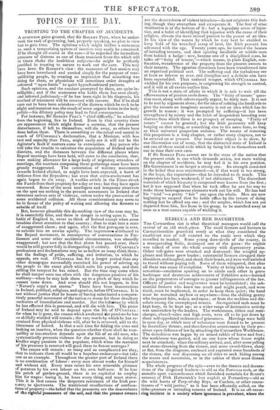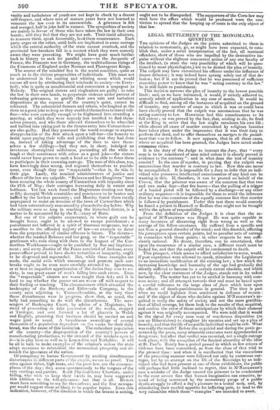REBECCA AND HER DAUGHTERS.
THE Carmarthen riot is what theatrical managers would call the revival of an old stock-piece. The small farmers and huxters in Carmarthenshire grumbled sorely at what they considered the exorbitant rate of toll exacted on the roads over which they travelled to market. Some young dare-devils of the county, in a masquerading frolic, destroyed one of the gates : the exploit was talked of over the whole country with deprecatory praise. Other toll-gates were attacked and destroyed : the mingled ap- plause and blame grew louder ; substantial farmers shrugged their shoulders, and laughed, and shook their heads, and were well satisfied to travel without paying toll. Sonic of them whispered, that after all there was cause of complaint. Vanity at being able to excite a sensation—emulation spurring on to outdo each other in grave burlesque and dexterous achievement of forbidden acts—hurried on the perpetrators of outrages to grosser infringements of the law. Officers of justice and magistrates must be intimidated ; the sub- stantial farmers who knew too much and might peach, and were timid, must be implicated, in order to keep them quiet ; the band must be recruited anyhow or anywhere—from the shifting gentry who frequent fairs, wakes, and races ; or from the reckless and dis- solute among the unemployed miners. An organized mob must be kept busy, to be kept up; so a wider range of destructive activity was undertaken by the leaders. The workhouses, tithes and rent- charges, church-rates and high rents, were all to be put down by these self-appointed redressers of grievances. Meetings were held in open day, at which men of substance were forced to be present by incendiary threats, and then forced to countenance by their pre- sence open defiance of law by attacking the Carmarthen Workhouse. The demolition was begun by an armed rabble of horse and foot ; the workhouse was gutted, and no one knew whose house might next be attacked ; when the military arrived, and, after some yelling and stone-throwing from the rioters, and some sword-blows, sharp or flat, from the dragoons, enclosed and captured some hundreds of the rioters, the rest dispersing on all sides to seek hiding among the moors and mountains, or in the cabins of their most distant
acquaintances. •
The whole progress of the epic—even to the dresses and decora- tions of the disguised leaders—is old as the Porteous mob, or the assaults upon customhouses which furnished materials for Scores account of Dirk Hatteraick's last exploit at Portanferry—old as the wild hunts of Peep.of-day Boys, or Carders, or other execu- tioners of " wild justice," as it has been affectedly called, on the tithe-proctors or intruding tenants of Ireland. It is an oft-recur- ring incident in a society where ignorance is prevalent, where the
vanity and turbulence of youth are not kept in check by a decent self-respect, and where men of mature years have not learned to venerate the law even in its unessentials. A grievance is felt and avenged, half in joke half in earnest. The sympathies of society are mainly in favour of those who have taken the law in their own hands ; still they feel that they are not safe. Their timid admirers, to reassure them, speak favourably, lend them countenance. Each party urges on the other, until both are implicated in some outrage which the central authority of the state cannot overlook, and the provincial law-breakers fall in a contest which they were scarcely aware they were provoking. We might have gone much further back in history to seek for parallel cases—to the Jacquerie of France, the Peasants war in Germany, the multitudinous risings of the Commons of England under Norman and Plantagenet Kings.
The source of the mischief lies in the social condition, quite as much as in the vicious propensities of individuals. This must not be understood in the canting and whining sense which would excuse all men by attributing their misdeeds to society—to Every- body, who is quite as unsubstantial and convenient a scapegoat as Nobody. The original rioters and ringleaders are guilty : to take the law in their own hands, to perpetrate violence under pretext of redressing grievances, to gratify their own vain and turbulent dispositions at the expense of the country's quiet, cannot be tolerated. The substantial farmers and others, who laughed at the riots as a good joke so long as they enabled themselves to travel toll- free—who were cowardly enough to be frightened into attending a meeting, at which they were scarcely less terrified to find them- selves present, and who there allowed themselves to be wheedled and bullied into taking part in the riotous entry into Carmarthen— are also guilty. Bad they possessed the moral courage to express disapprobation of the first attack upon a toll-bar—the honesty to insist upon paying their tolls and publishing that they had done so, instead of taking advantage of the riots to save them- selves a few shillings—had they not, in short, indulged an inveterate shortsighted selfishness, pretending all the while to laugh at their connivance with crime as a good joke—the rioters could never have grown to such a head as to be able to force them to participate in their crowning outrage. The men of this class, too, have knowingly done wrong, and exposed themselves to punish- ment, even though they are " respectable"—that is, do ride in their gigs. Lastly, the nominal administrators of justice and officers of the law are culpable. "Rebecca and her Daughters" have been scouring the whole county of Carmarthen with impunity since the 27th of May ; their outrages increasing daily in extent and boldness. Yet last week found the Magistrates sending out forty or fifty decrepid Welsh constables and pensioners to be beaten and baffled by the lawless peasantry ; and Monday found them totally unprepared to resist an invasion of the town of Carmarthen which had been ostentatiously announced by placards the day before. Why the military were so long in reaching the disturbed district, is a matter to be accounted for by the Scsretary of State.
Not one of the culprits enumerated, to whom guilt can be brought home, ought to be allowed to escape punishment ; a punishment not inflicted in a spirit of timorous vengeance, but as a sacrifice to the offended majesty of law—an example to deter from the perpetration of similar offences in future. The rioters— whether the masked Rebecca and her gang, or the " respectable " gentlemen who rode along with them to the leaguer of the Car- marthen Workhouse—ought to be punished by fine and imprison- ment ; and every Justice of the Peace convicted of lachesse, every peace-officer proved to have shown cowardice or incapacity, ought to be disgraced and superseded. But, while these examples are made, the social evils which encourage and promote such out- breaks ought to be even more carefully attended to. Ignorance, or at best an imperfect apprehension of the duties they owe to so- ciety, is one great cause of men's falling into such errors. Even the "respectable" sinners are worse taught than fed ; and it is hard to say whether the poorer set are worse off with respect to their feeding or teaching. The circumstances which attended the bankruptcy of the Sirrhowy and Ebbw-vale Company, in the county next adjoining to Carinarthenshire, at the very time those disturbances were in progress, show that, as usual, the belly bad something to do with the disturbances. The mes- sengers of Bankruptcy Court, by advice of a Magistrate, in- stead of proceeding to take possession of the works, stopped at Tredegar, and sent forward a lot of placards in Welsh and English, promising that business should be carried on and wages paid as usual. A tumultuous assemb:arr°e of several thousands of a population dependent on the works for their daily bread, was the cause of this hesitation. The redundant population of the country—the disproportion of the country's powers of manufacturing productions, to the demand of the markets open to it—is in play here as well as in Lancashire and Yorkshire. It will be all in vain to make examples of the criminals unless the state adopt measures to reestablish the economical prosperity and di- minish the ignorance of the nation.
Of conspiracy to harass Government by exciting simultaneous disturbances in different parts of the empire, we see no proof. The cries against tithes, high rents, and the poor-law, are the common- places of the day ; they come spontaneously to the tongues of the very starlings and parrots. Somh Physical-force Chartists, under hiding, who wish to keep their Lands in, may have suggested
this addition to the toll-grievance : but that is all. Rioters must have something to say for themselves ; and the first newspa- per would suggest these as likely to be popular topics. Even this indication, however, of the direction in which the breeze is setting, ought not to be disregarded. The supporters of the Corn-law may read here the effect which would be produced were the con- viction to spread that the keeping up of rents is the only object of that law.



























 Previous page
Previous page